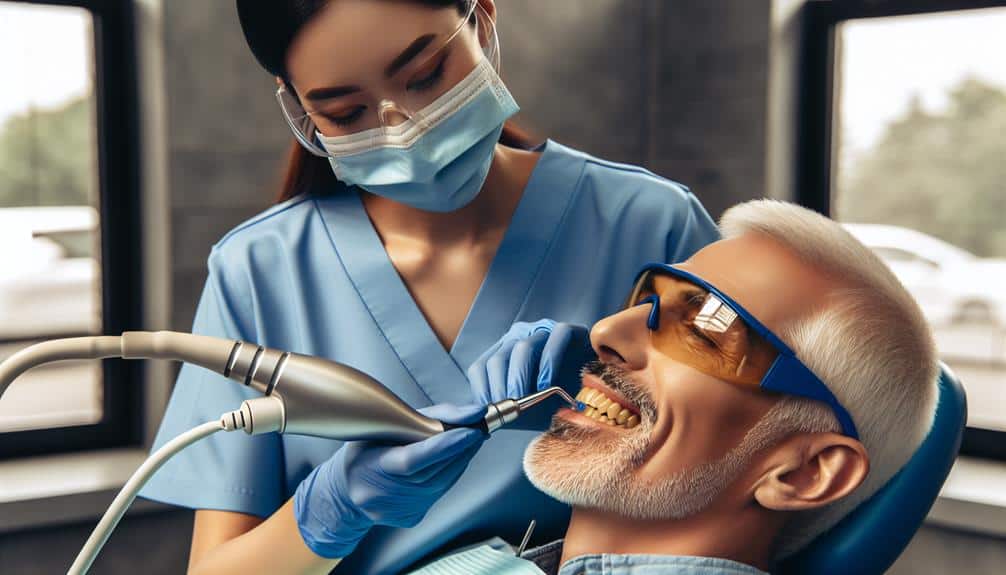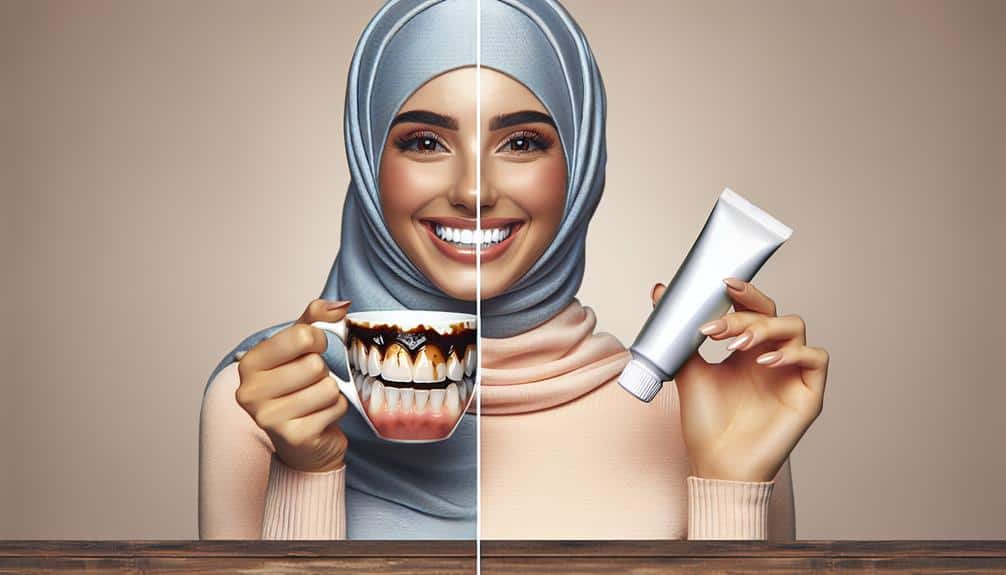For effective tea stain removal on your teeth, consider professional dental procedures like in-office whitening, laser treatment, bleaching, veneers, or scaling and polishing. A dentist will assess your teeth and offer a personalized plan. The procedures are quick, lasting, and provide noticeable results. They're more potent than at-home options and carry minimal risk under professional supervision. These methods not only whiten but also contribute to your oral health. By exploring these professional solutions, you can achieve a brighter smile with long-lasting effects. Start your journey to a stain-free, white smile today with these advanced dental treatments.
Key Points
- In-office laser teeth whitening targets and removes tea stains effectively.
- Professional bleaching treatments offer customizable and long-lasting results.
- Dental veneers are a durable and minimally invasive option for tea stain removal.
- Regular teeth scaling and polishing prevent tea stains and maintain oral health.
- Consult with a dentist for tailored solutions to whiten and prevent tea stains.
In-Office Teeth Whitening Options
When considering in-office teeth whitening options, it's essential to consult with your dentist to determine the best treatment plan for achieving your desired results. Your dentist will assess your dental health and the level of staining to recommend the most effective professional whitening procedure. In comparison to home whitening alternatives, in-office treatments provide quicker and more noticeable results due to the higher concentration of whitening agents used.
In addition to in-office treatments, natural stain prevention techniques can help maintain your newly whitened teeth. Consuming crunchy fruits and vegetables like apples and carrots can help scrub away surface stains. Calcium-rich foods such as cheese and yogurt can strengthen enamel and prevent staining. Moreover, limiting the intake of tea, coffee, and red wine can also help in preventing future discoloration.
Laser Teeth Whitening Procedure
For achieving a noticeably brighter smile, the Laser Teeth Whitening Procedure offers a highly effective and efficient solution. This advanced procedure utilizes laser technology to target and break down stubborn stains on the teeth, resulting in greatly improved whitening results.
Here are some key points to ponder about the Laser Teeth Whitening Procedure:
- Precision: The laser technology used in this procedure allows for precise targeting of specific areas on the teeth, ensuring thorough whitening results.
- Speed: Laser teeth whitening is a quick procedure that can often be completed in a single visit to the dentist's office, making it a convenient option for those with busy schedules.
- Minimal Sensitivity: Compared to some other teeth whitening methods, laser teeth whitening is known for causing minimal to no sensitivity during or after the procedure.
- Long-Lasting Results: With proper care and maintenance, the whitening results from laser teeth whitening can last for an extended period, providing a lasting improvement to your smile.
- Professional Supervision: This procedure is performed under the supervision of a dental professional, ensuring safe and effective whitening outcomes.
Professional Teeth Bleaching Treatment
Consider undergoing a professional teeth bleaching treatment to achieve a brighter and more radiant smile. Teeth bleaching benefits include the removal of stubborn stains caused by tea, coffee, or other pigmented foods and beverages. Professional bleaching treatments are often more effective than at-home alternatives, providing quicker and more noticeable results. The procedure is usually carried out by a dental professional who can customize the treatment to suit your specific needs, guaranteeing a safe and controlled process.
While there are various teeth whitening alternatives available, such as over-the-counter whitening kits, professional teeth bleaching treatments offer distinct advantages. Unlike store-bought products, professional treatments use higher concentrations of whitening agents, leading to more effective and longer-lasting results. Additionally, the supervision of a dental expert ensures that the procedure is done correctly, minimizing the risk of sensitivity or damage to the teeth and gums.
Dental Veneers for Tea Stain Removal
To address tea stains that persist even after professional teeth bleaching treatments, contemplate the option of dental veneers for a lasting solution to achieve a flawless, stain-free smile. Dental veneers are thin, custom-made shells placed on the front surface of teeth to improve their appearance.
Here are some key points to contemplate:
- Veneer Application: Veneers involve a minimally invasive procedure where a small amount of enamel is removed, and the veneers are bonded to the teeth for a natural look.
- Long Term Results: Veneers are durable and can last for 10-15 years with proper care, providing a long-lasting solution for tea stain removal.
- Veneers vs. Crowns: Veneers are more conservative than crowns as they require less tooth structure removal, making them a preferable option for stain removal.
- Cost Comparison: While veneers may have a higher initial cost compared to other treatments, their longevity and natural appearance make them a cost-effective choice in the long run.
- Maintenance: Regular dental hygiene practices such as brushing, flossing, and dental check-ups are essential to maintain the longevity and appearance of veneers.
Teeth Scaling and Polishing Techniques
Enhance your smile's brightness and health by exploring effective teeth scaling and polishing techniques. Regular teeth scaling and polishing are essential components of oral hygiene and dental care. Scaling involves the removal of plaque and tartar from the tooth surfaces, particularly along the gumline where brushing and flossing may not reach effectively. This process helps prevent gum disease and maintains overall oral health.
During a teeth polishing procedure, a dental professional uses a special tool to remove stains and plaque that regular brushing can't eliminate. Polishing not only enhances the appearance of your teeth by making them smoother and brighter but also helps in preventing future stains from adhering to the teeth surfaces.
Maintaining a consistent schedule of teeth scaling and polishing as part of your dental care routine can notably contribute to a healthier mouth and a more radiant smile. By prioritizing these techniques, you're actively investing in the longevity of your oral health and the vibrancy of your smile.
Frequently Asked Questions
Are There Any Specific Dietary Restrictions to Follow After Undergoing a Professional Dental Procedure for Tea Stain Whitening?
After your professional dental procedure for tea stain whitening, it's important to follow specific dietary restrictions. Avoid foods and drinks that may restain your teeth, like tea, coffee, and red wine. Opt for white or clear liquids and soft foods to maintain your bright smile.
How Long Do the Results of a Professional Teeth Bleaching Treatment Typically Last?
For long-term effectiveness post-teeth bleaching, proper maintenance is key. Regular dental hygiene, avoiding staining foods/drinks, and touch-up treatments can help sustain results. While professional procedures offer lasting outcomes, DIY options may vary in cost and effectiveness.
Can Dental Veneers Be Used to Fix Other Cosmetic Issues Besides Tea Stain Removal?
When looking to enhance your smile, dental veneers offer a versatile solution beyond tea stain removal. These thin shells can mask various cosmetic flaws, but keep in mind their irreversible nature and consider alternatives for a personalized approach.
Is There a Risk of Tooth Sensitivity After Receiving Laser Teeth Whitening?
After laser teeth whitening, you may experience tooth sensitivity. Precautions like using desensitizing toothpaste can help. Recovery time varies but typically lasts a few days. Laser whitening is effective and safe when done by professionals.
Are There Any Alternative Methods to Traditional Teeth Scaling and Polishing Techniques for Removing Tea Stains?
Looking to tackle tea stains without traditional methods? Explore home remedies like baking soda and hydrogen peroxide, or over-the-counter products such as whitening toothpaste. DIY solutions and natural products offer alternatives worth considering for a brighter smile.



